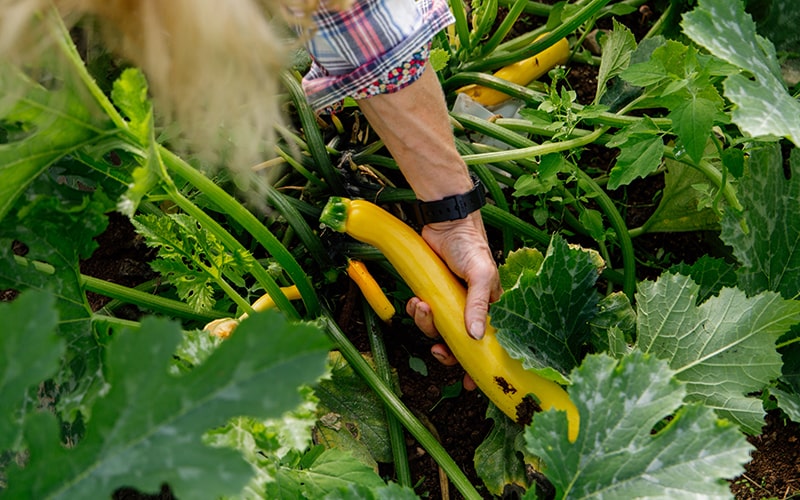How Organic Farms Help Battle Climate Change
The Second in our Organic September Newsbeet Article Series
This year, the Soil Association and the Organic Trade Board are using their annual Organic September campaign to emphasise how certified organic farms and producers help to protect nature, wildlife and the planet. We’re jumping on the organic bandwagon to highlight that by shopping with us, you can help to work with nature and restore a healthy planet.
We’re working to raise awareness of the benefits of organic for the planet and the soil, for wildlife and for you and your family. We kickstarted our Organic September Campaign by introducing the first benefit of organic food and farming in our Newsbeet Article The True Standard of Animal Welfare. Next, we’re tackling how organic farms like ours help to battle climate change…
Organic is Better for the Planet
When talking about organic farming, many use terms such as “closed loop”, “whole system” or “holistic system”. This means that organic farming aims to support food and agricultural systems as a whole, from the deepest roots to the highest-flying birds and everything in between. Organic farms actively work to “close the loop”, using materials from the farm in its continued productivity and reducing imported resources. Working with nature, not against it, is a core principle of organic farming, making a solution that is better for the planet.

But how do organic farms help the planet? Firstly, organic farms produce lower emissions than most traditional farms, since organic farmers don’t use artificial fertilisers or pesticides produced from burning fossil fuels. Soil Association certified organic farms are also restricted on their use of peat, and at Eversfield Organic we never use wetland peat for propagation or planting. Mining peat for farming unlocks reserves of stored carbon, releasing carbon dioxide and other greenhouse gases into the atmosphere. These important carbon sinks also support biodiversity. Instead, we use Soil Association approved compost collected by screening peat and leaf mould from streams and rivers (a natural effect of upland erosion).
The Soil Association state that if Europe’s farmland all followed organic principles, agricultural emissions could drop by 40-50% by 2050, with plenty to feed the growing population healthy diets. Sounds good to us.
A Strong Choice
It’s also true that organic farms and organic food are more resilient to the effects of climate change. Organic soils can store up to twice as much water, making them more suitable for the changing weather conditions. Not only does this protect agricultural land against flooding, but it also means organic soils and crops can perform better during droughts. With more and more extreme weather events across the globe, organic seems like a strong choice when it comes to farming.

Not only can organic soils hold more water, but when treated correctly, they also draw in and store carbon. This process, known as carbon sequestration, is a result of the healthy, living soils found on organic farms. Natural compost and fertiliser (thanks to our herd of Aberdeen Angus heritage cattle) nourishes the soil right here on the Eversfield Organic farm where this process takes place. Organic farmland sequesters an average of 3.5 tonnes more carbon per hectare than traditional farmland, with organic soils around 25% more effective at storing the carbon long term.
It Starts with the Soil
As you can see, the soil plays a vital role in helping organic farms to be the more sustainable choice. Our soil is a non-renewable resource, meaning when it’s gone, it’s gone, so we are always looking at different ways to protect and enhance our soil. Such methods include our rotational grazing system and composting at our Market Garden. Allowing our herd of grass fed cattle to graze on our organic pasture ensures natural fertilisation, but if they chomp down too far it can be extremely damaging to the grass roots. We carefully plan a rotational grazing system, also known as mob grazing, which sees our inquisitive herd move from field to field to allow the ground to breathe and our cattle to explore.

Composting at our farm’s Market Garden is another way in which we return nutrients to the soil. Improving soil structure for planting by helping to fulfil the nutritional content of the earth produces some of the tastiest organic vegetables, brimming with nutrients themselves. Careful composting also helps to achieve our closed loop system, with our herd only fed organic pasture or hay and our organic fruit and veggies only grown in organic soil. As always, artificial fertiliser and pesticides are not used or needed thanks for our composting efforts.
When you shop with us at Eversfield Organic, whether you plump for a grass fed organic meat cut or a box filled with the most delicious and nutritious organic veg, you can truly taste the difference. If the planet had a choice, it would choose organic.


